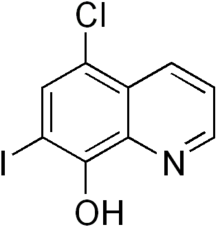
Posted on 01/06/2009 3:20:16 PM PST by decimon
Clioquinol inhibits action of the CLK1 aging gene, may alleviate Alzheimer's
Recent animal studies have shown that clioquinol – an 80-year old drug once used to treat diarrhea and other gastrointestinal disorders – can reverse the progression of Alzheimer's, Parkinson's and Huntington's diseases. Scientists, however, had a variety of theories to attempt to explain how a single compound could have such similar effects on three unrelated neurodegenerative disorders.
Researchers at McGill University have discovered a dramatic possible new answer: According to Dr. Siegfried Hekimi and colleagues at McGill's Department of Biology, clioquinol acts directly on a protein called CLK-1, often informally called "clock-1," and might slow down the aging process. The advance online edition of their study was published in Oct. 2008 in the Journal of Biological Chemistry.
"Clioquinol is a very powerful inhibitor of clock-1," explained Hekimi, McGill's Strathcona Chair of Zoology and Robert Archibald & Catherine Louise Campbell Chair in Developmental Biology. "Because clock-1 affects longevity in invertebrates and mice, and because we're talking about three age-dependent neurodegenerative diseases, we hypothesize that clioquinol affects them by slowing down the rate of aging."
Once commonly prescribed in Europe and Asia for gastrointestinal problems like diarrhea and shigella, clioquinol was withdrawn from the market after being blamed for a devastating outbreak of subacute myelo-optic neuropathy (SMON) in Japan in the 1960s. However, because no rigorous scientific study was conducted at the time, and because clioquinol was used safely by millions before and after the Japanese outbreak, some researchers think its connection to SMON has yet to be proven.
The exact mechanism of how clioquinol inhibits CLK-1 is still under investigation, Hekimi said. "One possibility is that metals are involved as clioquinol is a metal chelator," he explained. Chelation is a type of binding to metal ions and is often used to treat heavy metal poisoning.
Hekimi is optimistic but cautious when asked whether clioquinol could eventually become an anti-aging treatment.
"The drug affects a gene which when inhibited can slow down aging," he said. "The implication is that we can change the rate of aging. This might be why clioquinol is able to work on this diversity of diseases that are all age-dependent."
However, he admits to being concerned about how people may interpret his results.
"The danger is that you can buy a kilogram of this compound at a chemical wholesaler, but we don't want people to start experimenting on themselves. Clioquinol can be a very toxic substance if abused, and far more research is required."
###
ABOUT McGILL UNIVERSITY
McGill University, founded in Montreal, Que., in 1821, is Canada's leading post-secondary institution. It has two campuses, 11 faculties, 10 professional schools, 300 programs of study and more than 33,000 students. McGill attracts students from more than 160 countries around the world. Almost half of McGill students claim a first language other than English – including 6,000 francophones – with more than 6,200 international students making up almost 20 per cent of the student body.

Cincinnati, Ohio?
Thanks for the pic! Happy New Year!
Whew, thought it was going to be ‘Banthene’ for a minute there.
I expected to see Paragoric Acid revealed as the miracle cure. Be hard to convince some people otherwise, anyway.
LOL !
It might not help but you won't care.

Maybe if Proctor & Gamble Pharma manufactures it ;-)
Now, the bad news:
[77 year old] ‘Rip’ Torn charged with drunk driving
Register Citizen | Jan 2 2009 | Tracy Kennedy
Posted on 01/06/2009 9:24:23 AM PST by Daffynition
http://www.freerepublic.com/focus/f-chat/2159679/posts
Unlimited technology from the whole universe, and he was driving around in a Ford POS. /rimshot!
chelation ..... that process I know due past exposures when active duty. Is this the path they seek to remove metal from the body to reduce or reverse the effects ??
Maybe ol’ Rip would have been less ripped if on clioquinol?
He probably would have been alright if he hadn’t been out that last galactic standard year.
Is Clioquinol legally being prescribed anymore?
Probably not on open script, just as a research exclusion.
Basically, yes, but it can have adverse effects too. You don't want to take Cipro and drink milk or eat food containing calcium. IIRC, the Cipro chelates the calcium interfering with absorption.
chelation therapy the use of a chelating agent to remove toxic metals from the body, used in the treatment of heavy metal poisoning. In complementary medicine, also used for the treatment of atherosclerosis and other disorders.
Dorland's has entries for chelate, chelating agent and chelation also. I recommend saving it to your Favorites in your toolbar.
It comes as an antifungal cream or ointment.
There is another old stomach drug used in anti-aging cosmetics now, teprenone. I think there is another one also.
Disclaimer: Opinions posted on Free Republic are those of the individual posters and do not necessarily represent the opinion of Free Republic or its management. All materials posted herein are protected by copyright law and the exemption for fair use of copyrighted works.